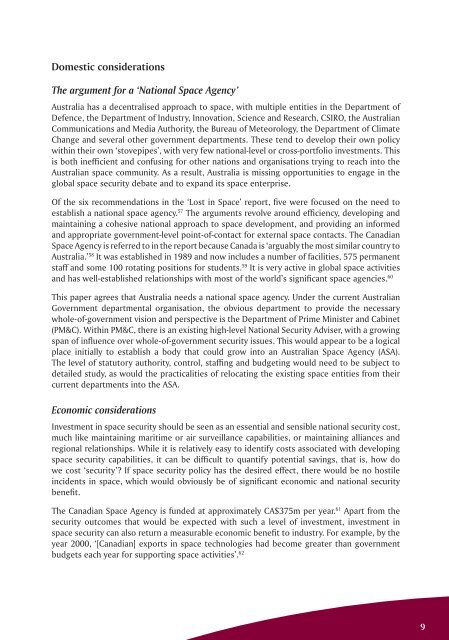ISSUE 183 : Nov/Dec - 2010 - Australian Defence Force Journal
ISSUE 183 : Nov/Dec - 2010 - Australian Defence Force Journal
ISSUE 183 : Nov/Dec - 2010 - Australian Defence Force Journal
Create successful ePaper yourself
Turn your PDF publications into a flip-book with our unique Google optimized e-Paper software.
Domestic considerationsThe argument for a ‘National Space Agency’Australia has a decentralised approach to space, with multiple entities in the Department of<strong>Defence</strong>, the Department of Industry, Innovation, Science and Research, CSIRO, the <strong>Australian</strong>Communications and Media Authority, the Bureau of Meteorology, the Department of ClimateChange and several other government departments. These tend to develop their own policywithin their own ‘stovepipes’, with very few national-level or cross-portfolio investments. Thisis both inefficient and confusing for other nations and organisations trying to reach into the<strong>Australian</strong> space community. As a result, Australia is missing opportunities to engage in theglobal space security debate and to expand its space enterprise.Of the six recommendations in the ‘Lost in Space’ report, five were focused on the need toestablish a national space agency. 57 The arguments revolve around efficiency, developing andmaintaining a cohesive national approach to space development, and providing an informedand appropriate government-level point-of-contact for external space contacts. The CanadianSpace Agency is referred to in the report because Canada is ‘arguably the most similar country toAustralia.’ 58 It was established in 1989 and now includes a number of facilities, 575 permanentstaff and some 100 rotating positions for students. 59 It is very active in global space activitiesand has well-established relationships with most of the world’s significant space agencies. 60This paper agrees that Australia needs a national space agency. Under the current <strong>Australian</strong>Government departmental organisation, the obvious department to provide the necessarywhole-of-government vision and perspective is the Department of Prime Minister and Cabinet(PM&C). Within PM&C, there is an existing high-level National Security Adviser, with a growingspan of influence over whole-of-government security issues. This would appear to be a logicalplace initially to establish a body that could grow into an <strong>Australian</strong> Space Agency (ASA).The level of statutory authority, control, staffing and budgeting would need to be subject todetailed study, as would the practicalities of relocating the existing space entities from theircurrent departments into the ASA.Economic considerationsInvestment in space security should be seen as an essential and sensible national security cost,much like maintaining maritime or air surveillance capabilities, or maintaining alliances andregional relationships. While it is relatively easy to identify costs associated with developingspace security capabilities, it can be difficult to quantify potential savings, that is, how dowe cost ‘security’? If space security policy has the desired effect, there would be no hostileincidents in space, which would obviously be of significant economic and national securitybenefit.The Canadian Space Agency is funded at approximately CA$375m per year. 61 Apart from thesecurity outcomes that would be expected with such a level of investment, investment inspace security can also return a measurable economic benefit to industry. For example, by theyear 2000, ‘[Canadian] exports in space technologies had become greater than governmentbudgets each year for supporting space activities’. 629
















